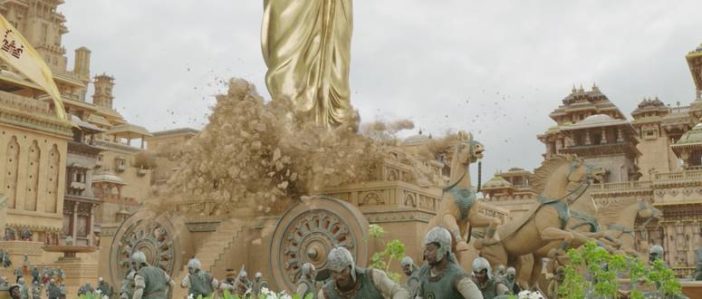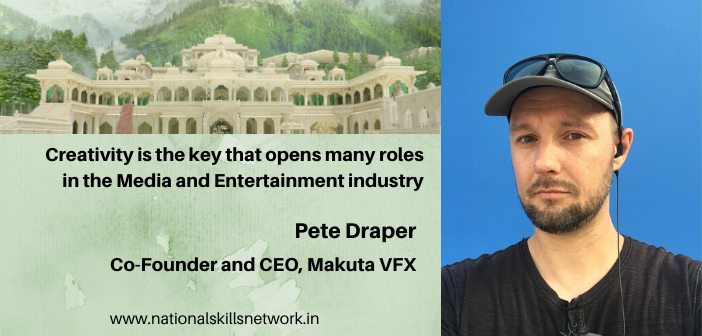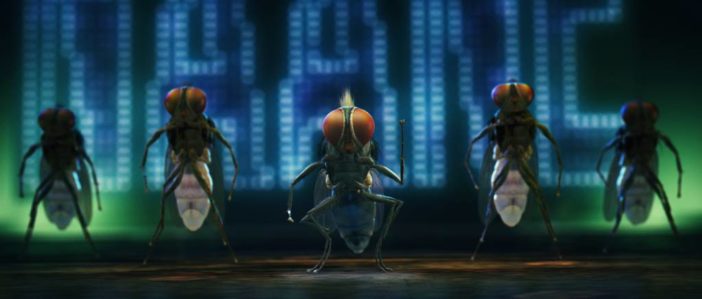From creating mind boggling visual effects for India’s biggest film, Baahubali, to winning several awards in the Visual Effects (VFX) category over the years, Makuta has never rested on its laurels. Within 10 years of its inception, Makuta has established itself as one of India’s leading VFX studios, creating many jobs and building innovative careers in the industry. We caught up with Pete Draper, Co-Founder and CEO, to understand the role of education, skills and training. Here we go with Pete’s views on the importance of creativity and related skills to build a career and what the Entertainment industry expects from the ideal candidate.
Q: Tell us about how Makuta was started and how you got associated with it.
A: Makuta was started in 2010 by Adel Adili, Kamalakannan and myself after working together on Magadheera. I used to shuttle between UK and India, working on many projects simultaneously. We are an internationally-recognised studio for visual effects and having branches overseas and have worked on some of the largest and most prestigious projects within the Indian film industry with renowned directors like SS Rajamouli, AR Murugadoss, Bapu and Shankar. Hopefully our work speaks for us and it has been getting us more recognition.
 Q: What is the most important skill or ability that you seek in your employees?
Q: What is the most important skill or ability that you seek in your employees?
A: Creativity! While technical knowledge can be formally acquired, creativity cannot be taught or forced upon someone. We look for people who are proactive, open to new ideas, has forward thinking and the techniques they use in accomplishing things. Moreover, we don’t just go by their resumes or graduation certificates. I need proof of their knowledge and experience which comes from a showreel or portfolio. A Showreel is necessary for getting into any creative profession such as VFX or film making; it’s a proof of their talent. Also, each position has various requirements so a reel should be tailored to suit that role. This helps in assessing how much the person knows and what he or she can do or deliver.
 Q: Do you put your team into training or upskill them since VFX is based on technology and tools that keep changing?
Q: Do you put your team into training or upskill them since VFX is based on technology and tools that keep changing?
A: So far, we did not have the need to do a large amount of internal training as they tend to self-develop faster than we need to teach! We do a lot of research in the software and teach them some techniques; there is occasional resistance from some of them while migrating from one software to the other, but we try to make them understand that it is necessary for an artist to develop to learn new tools and techniques. And migrating to better software makes our work easier, faster and brings out the best artistic quality.
Q: Many of the students have the certificate of graduation but not relevant skills. Do you think it is to do with the education system that we are currently following in India?
A: I have been an external examiner for couple of universities back in my country. I used to do a lot of research and write educational papers, so I have an idea of how modules are constructed, how the course is structured and how the students are assessed. It is quite similar in both UK and India. But the only difference here is, you do not need any prerequisite to get into a course in VFX or similar disciplines. Anyone can join, provided you pay the prescribed fee. But in the UK, you need to fulfil certain prerequisites such as demonstration of interest and a hunger to explore, learn, grow, and be self-driven.
Whereas here, some of them who do these courses come without any indication of their interest or creative pursuits. We end up with a substantial number of students who don’t have a high interest in creative fields trying to join a creative industry. Moreover a lot of the times the business model of some training institutes is based on placements which doesn’t help develop and nurturing potential talent.
Let me give an example; anyone can become a painter in 5 seconds – take a paint brush, dip in the paint and make strokes on canvas. Boom! You are a painter. Do you understand what’s missing here? The method of painting is taught, but the rest of it; from this level to being able to paint the Mona Lisa is purely down to experience and drive to expand one’s knowledge and development. You cannot force creativity onto somebody. Creativity has been whittled away by some parents when we’re kids, which happens more often than not.
India has such a huge history of art. For example, in Mahabalipuram, monuments, sculptures and rock temples are amazing works. Today, the only ones who create a piece of art are the graphic artists, game designers, website designer, or people on the road-side who sculpt. I could get that guy and teach him the software and make him best digital sculptor. You don’t necessarily need technical knowledge in this industry; you just need creativity. Technical knowledge can be taught. Creativity must be grown.
 Q: How should one develop creativity? And how does it make a difference in a person’s life?
Q: How should one develop creativity? And how does it make a difference in a person’s life?
A: Every child is born creative. They play, paint, draw and model stuff using their hands. However this is whittled away as they grow older. It could be because of parental influence or the mass model of education, but it is necessary that we take out some time to do what we like. Even if they are not getting into a creative field, they should have a creative hobby of some kind. It must be noted that most business leaders are creative. Creativity does not always mean painting or sculpting something. It means thinking outside the box, lateral thinking, being flexible, coming up with innovative solutions. This helps them because they have flexibility in mind to come up with new ideas. As a species we were creative from day one. It wasn’t an MBA who created a wheel, it was creative person who saw a solution to a problem.
Q: What is your message for youngsters who would like to get into this field?
A: No matter what you want to do, what role you want to get into, what course you want to pursue in the creative industry, make sure you are enjoying it. Start creating art and don’t worry if it’s terrible. Your next one will be better! Don’t get disheartened if someone belittles you. Today, anyone and everyone is a critic and has an opinion on everything, but try to take criticism constructively. Self-assess yourself and don’t forget your creative ability grows with time.
Remember, the graduation certificate is similar to the driving test that we undergo, based on certain eligibility criteria.
A driving certificate is simply a piece of paper which says you are at a particular level in driving skills. But we do not remain at the same level forever. We get better with experience. Real driving test tells us how not to die on a road and how to not hit another car or pedestrian. We are taught how to hold the steering, how to change the gear etc but the anticipation while driving cannot be easily taught; it comes from experience and we become better by exposure. Creative development is the same. That piece of art that you created 6 months ago may not be something that you like now. That is because your ability to self-assess has improved. And with practice you’ll just keep getting better at it.












